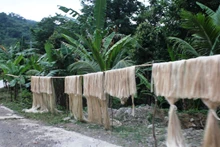
Climate change is exacerbating serious health issues worldwide, disproportionately affecting our most vulnerable members, children. As per a study, conducted by a group of researchers led by the University of Western Australia, there are detrimental effects of climate change on children's health. The comprehensive analysis, published in the Science of the Total Environment journal, highlights the significant risk posed by exposure to extreme temperatures, with a shocking 60% increase in the risk of preterm birth.
This study offers the first thorough examination of climate change's impact on children's health, specifically focusing on premature births, revealing alarming increases, and highlighting the serious health risks posed by climate-related factors. The research team meticulously examined data from 163 health studies worldwide, painting a grim picture of the future health outcomes for millions of children. Beyond the increased risk of preterm birth, the findings indicate a multitude of other adverse health effects, including increased respiratory illnesses and a surge in hospitalizations.
Impact of Climate Change on Premature Births
The findings of the study highlight a concerning correlation between premature births and climate change. According to the research, there is a potential 60% increase in the risk of preterm birth associated with exposure to extreme temperatures. This global trend of rising preterm births poses significant health risks for millions of children worldwide in the long term. Urgent action is required to mitigate the impact of climate change on maternal and child health.
Impact of Climate Change on Child Health
Climate change not only increases the likelihood of premature births but also exacerbates respiratory illnesses, mortality rates, and overall morbidity in children. Factors such as air pollutants and extreme weather events like cold snaps, droughts, and heavy rainfall contribute to adverse health outcomes, highlighting the diverse array of challenges stemming from climate change.
Socioeconomic Disparity
One concerning aspect highlighted by the research is the disparity in studies conducted, with the majority focused on high-income nations. This discrepancy underscores the stark reality that children in lower-income countries face the greatest risk due to inadequate healthcare, infrastructure, and food security. The socio-economic divide emphasizes the need for inclusive, equitable strategies to address climate-related health disparities on a global scale.
The economic and social costs of inaction are staggering, with climate-related diseases imposing significant financial burdens on societies worldwide. Asthma alone could cost up to US$1.5 billion during a single fire season, with each case of childhood asthma potentially costing up to US$23,573 in the future. The research notes the urgent need for proactive measures to mitigate these escalating costs and safeguard children's health.
The findings underscore the critical imperative for immediate action to protect children from the rising health threats posed by climate change. Effective public health policies, coupled with proactive climate adaptation and mitigation strategies, are essential to safeguarding the health and future of our children. The time to act is now to ensure that children worldwide inherit a planet free from the shadow of climate-induced health crises.
As we confront the depressing realities of climate change's impact on children's health, we must prioritize concerted global efforts to mitigate its effects.
Our new global systematic review & meta-analysis just out:
— ConservationBytes (@conservbytes) February 21, 2024
How #climatechange degrades child #healthhttps://t.co/cogjdSRQrw
led by Lewis 'Darth' Weeda@selretep @ciao_chitra










